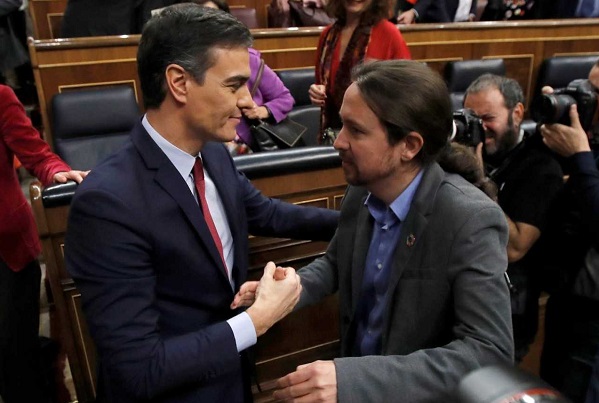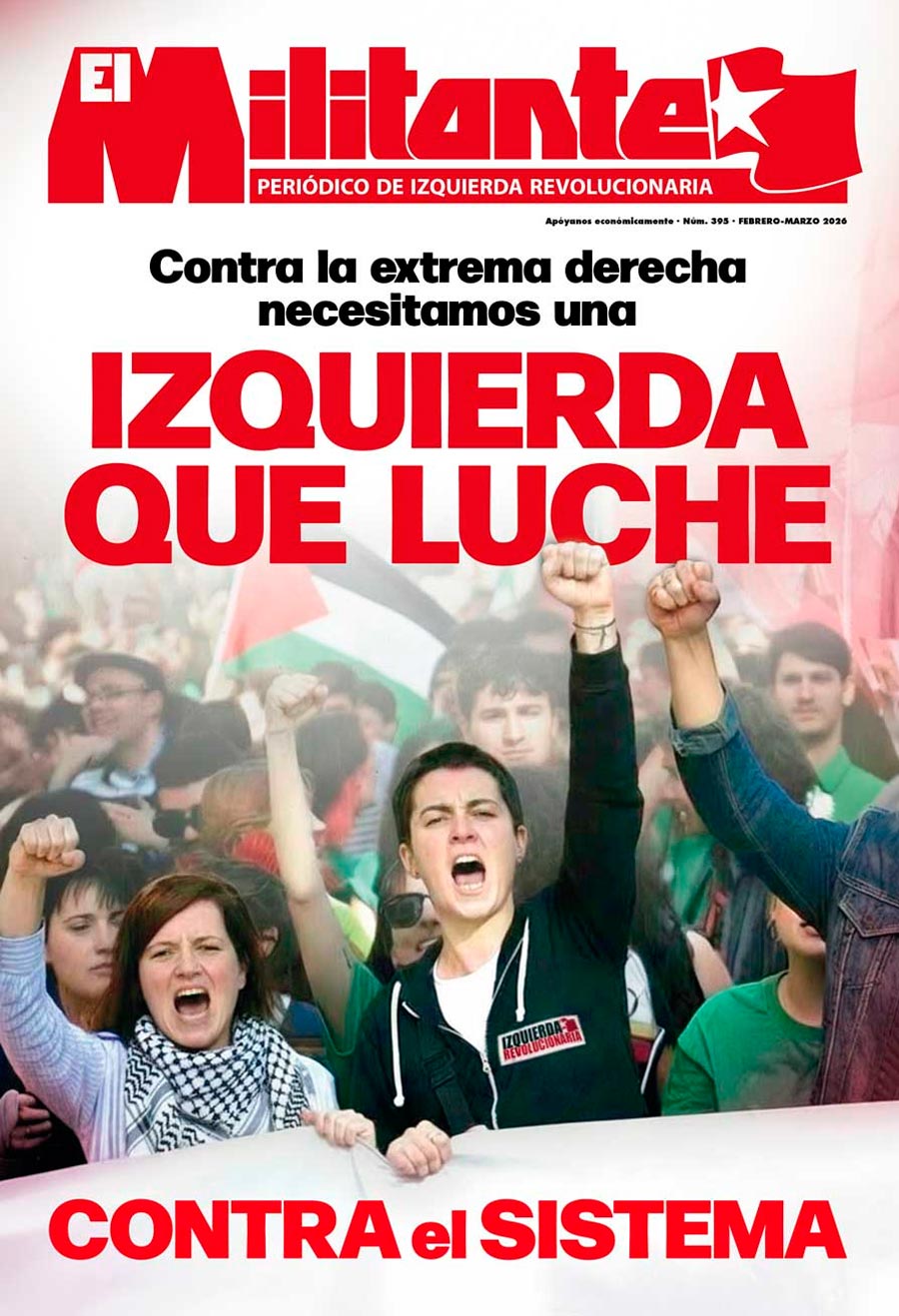The coalition government has been inaugurated in a climate of polarisation and acute social crisis, and its politics will be conditioned by the great pressures of opposing classes.
Division of tasks?
On one hand, the aspiration of the electoral and social basis of PSOE and Unidas Podemos: the millions of young people, workers, pensioners, etc., who have been active on the streets and ballot boxes. They wait for and need a real improvement on their living and working conditions. The massive general strike of 30th January in Euskal Herria (Basque Country) shows that the working-class will not pass a blank cheque to the new Government.
On the other hand, the big economical powers and the european bourgeoisie will not allow the enaction of any measure that goes against their interests. Their austerity agenda needs to be taken to the last consequences.
These antagonistic pressures are already showing. On the 21st of January, whilst Pablo Iglesias took part at a demonstration to pay tribute to the workerś lawyers and the youth assassinated by the fascists and the police in the “dark week” of January 1977, Pedro Sanchez was on route to Davos to participate in the World Economic Forum, meet with hedge fund managers, banks and big companies representatives, so he could guarantee that they have nothing to fear from the actions of his government.
The European bourgeoisie is leaning on the new Cabinet to maintain the politics of cuts and austerity. Unfortunately, the new government already showed that they will obey their wishes. Brussels has demanded that Spain’s budget deficit is reduced by 8 0000 million euros. In fact, a reform of the 135th article of the Constitution, agreed by Zapatero (former PSOE prime minister) and PP, stating that the debt interests to the big banks need to be paid before any other state expenditure- has been in effect since the 1st of January. Paradoxically, it will be this new government, with 5 Unidas Podemos ministers, the first one to have to comply with this rule.
The room for maneuver given by the budget rules is minimal. The increase in State revenue from the planned tax increases, in a context of obvious economic deceleration, is not near enough to fulfill the modest aims set by the new coalition government.
On the other side, the 2012 labour law reform has led to the breakdown of collective bargaining. In November 2019, only 9.21 million workers were covered by collective agreements, the lowest number in 20 years. The loss of labour rights, the low wages and the precarious working conditions have allowed the capitalists and entrepreneurs to accumulate huge profits and benefits.
To drastically change the current situation and to take in-depth measures that benefit the working-class, a break with austerity and firm opposition to the capitalists and their international institutions is needed
First measures by the PSOE-UP government
The government has taken its first decisions: To increase pensions by 0.9%, public workers wages by 2% and the minimum wage to 950 euros/month. Although these measures were announced with loud fanfare the truth is that they are a far cry away from the already humble objectives set in the agreement signed by Pedro Sanchez and Pablo Iglesias.
Euskal Herria’s (Basque Country) pensioners platform has reminded the government that the pension increases only match the rise in the cost of living, and that a real and dignified increase of the minimum pension needs to surpass that. At the same time, the 2% increase in public workers wage is set against a 20% decrease of buying power since 2010. In relation to the minimum wage, the small increase puts in danger the aim of reaching 1200 euros by the end of the term- as it was recognised by Yolanda Diaz, Minister of Labour. To this, we need to add the various mechanisms used by employers to avoid paying even the minimum wage.
The bosses have agreed with the increase in the minimum wage in exchange for an official confirmation by the government that they would not reverse PP’s labour reform, except some of the most outrageous parts such as allowing dismissals due to sickness.They will also not reverse the subsequent reforms which increased the age of retirement, and Moncloa (the prime-minister residence) sources are already talking about a new education law that replaces the LOMCE*.
Definitively, we have started this term with measures that are a far cry to what was promised, and clear political retreats that will embolden the right-wing.If the government thinks that the correct path is by not provoking the reactionaries and by renouncing the promised programme, or to “slowly go”, piecemeal by piecemeal to ensure the social peace, the class struggle will awaken them to the reality.
Right-wing offensive
The PSOE-UP coalition government was not the wish of the capitalists. We cannot forget that the current process of huge mobilisations starting in 2011 was crucial to turn the political table and to allow this Government to exist. In these conditions, the bourgeoisie is trying to manage a situation imposed by the development of the class struggle. And it is not unanimous on how to do this.
Relying on the support of a wide sector of the ruling class and the state apparatus, Vox and PP have made it clear that they will give no quarter to the government. They have set their sights on destroying the democratic and social rights achieved by the working-class, the women’ s movement and the youth. The campaign for the parental pin** and criminalisation of the Catalan people, are straightforward examples. The reaction will not hesitate in using all means at its disposal in the parliament, state apparatus and through street mobilisation and demonstrations to harass and weaken the government and strength is support base.
At the same time, more and more capitalists are trying to lay siege to the government using other means. Antonio Garamendi’s speech (the leader of the Spanish Business Organisation), has swapped his bellicose tone for more moderate and collaborative words. In an interview to Euskadi Radio on the 10th of January, he underlined that the government was a legitimate government and asked the opposition to be “strong and assertive but loyal because social upheaval and conflict is not good”. After assuming that he congratulated Pablo Iglesias, he affirmed that it was “time to have a talk around the table” and to offer the Executive ``collaboration with a sense of State and institutional loyalty”, although he also underlined that we will see which electoral promises can be fulfilled and which cannot.”
PSOE- who controls the key ministries and manages the overwhelming majority of the State budget- has given enough guarantees of stability to be trusted by Ibex35 (Spanish Stock Exchange). It is not a coincidence that Pedro Sanchez has placed Nadia Calvino as the head of the powerful Economy Ministry: her role is to protect the policies which ensure the best interests of big business, banks and EU.
PSOE leaders seem pleased with Unidas Podemos ministers, and Pedro Sanchez has showered them with praise during the last governmental meeting. This is something on which the left activists, which have fought the big battles in the streets in the last few years, should reflect.
It is not our intention to have a sectarian attitude. We need to make a stand against the right wing and to do it seriously. So, when Pablo Iglesias (leader of Podemos) and Alberto Garzon (leader of Izquierda Unida) justify their concessions with the fact that the parliamentary support for the executive is weak and they are in minority in the government, they do no more than head into a blind alley. This is the path to “lesser-evilism” and to be in conflict with their natural support base. In this sense, the shameful opposition of Unidas Podemos to the recent general strike in the Basque Country is an ominous sign.
The lessons of history are to be heeded. To enact policies in favour of the workers, youth and the disadvantaged, even if they are small reforms, demands confrontation with the big economic powers and with the reactionaries, and can only be achieved by organising and propelling the struggle of the working-class and youth on the streets.
Only through this course of action can they overcome the supposed “parliamentary weakness”, which, obviously, does not accurately reflect the moment in the class struggle and the power between classes.
“Do not stop criticizing us, do not stop pressuring us”, Pablo Iglesias insisted, when he was made Vice-President. Millions of workers have taken heed and will take this seriously into account.
*LOMCE- the regressive and francoist education law which tried to impose religious education and exams from the times of Franco on the students.
** A measure that would allow parents’ to decide what students can learn, which would mainly affect the teaching of Personal, Social, Health and Economic (PSHE) Education by forbidding students to access needed sexual health and planning lessons.





















































